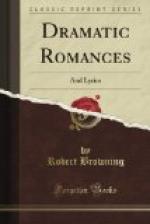While the other, thro’ locks of curled wire,
Is watching how sleek
Shines the hog, come to share in the windfall
—Chew, abbot’s own cheek!
All is over. Wake up and come out now,
And down let us go,
And see the fine things got in order
At church for the show
Of the Sacrament, set forth this evening.
To-morrow’s the Feast 250
Of the Rosary’s Virgin, by no means
Of Virgins the least,
As you’ll hear in the off-hand discourse
Which (all nature, no art)
The Dominican brother, these three weeks,
Was getting by heart.
Not a pillar nor post but is dizened
With red and blue papers;
All the roof waves with ribbons, each altar
A-blaze with long tapers; 260
But the great masterpiece is the scaffold
Rigged glorious to hold
All the fiddlers and fifers and drummers
And trumpeters bold,
Not afraid of Bellini nor Auber,
Who, when the priest’s hoarse,
Will strike us up something that’s brisk
For the feast’s second course.
And then will the flaxen-wigged Image
Be carried in pomp 270
Thro’ the plain, while in gallant procession
The priests mean to stomp.
All round the glad church lie old bottles
With gunpowder stopped,
Which will be, when the Image re-enters,
Religiously popped;
And at night from the crest of Calvano
Great bonfires will hang,
On the plain will the trumpets join chorus,
And more poppers bang. 280
At all events, come-to the garden
As far as the wall;
See me tap with a hoe on the plaster
Till out there shall fall
A scorpion with wide angry nippers!
—“Such
trifles!” you say?
Fort
Men
meet gravely to-day
And debate, if abolishing Corn-laws
Be
righteous and wise
290
—If ’twere proper, Scirocco should
vanish
In
black from the skies!
Notes: “The Italian in England.” An Italian patriot who has taken part in an unsuccessful revolt against Austrian dominance, reflects upon the incidents of his escape and flight from Italy to the end that if he ever should have a thought beyond the welfare of Italy, he would wish first for the discomfiture of his enemies and then to go and see once more the noble woman who at the risk of her own life helped him to escape. Though there is no exact historical incident upon which this poem is founded, it has a historical background. The Charles referred to (lines 8, 11, 20, 116, 125) is Charles Albert, Prince of Carignano, of the younger




